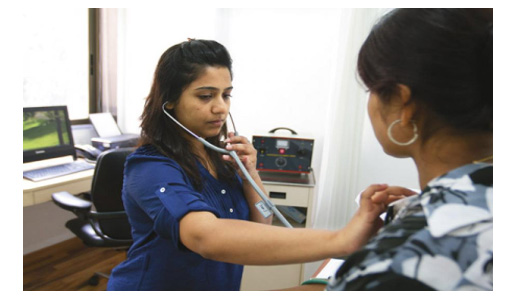
06
Nov
How to Overcome Postpartum Depression
The period following the birth of your child can be a roller coaster of emotions. You may experience a range of emotions, from delight to fear to despair. If these emotions start interfering with your daily activities, you may be suffering from Postpartum Depression (PPD).
Difficulty bonding with your baby, depressed mood or severe mood swings, excessive crying, loss of appetite, insomnia, overwhelming fatigue or loss of energy, intense irritability, and anger are some of the symptoms of postpartum depression.
Symptoms normally appear a few weeks after delivery, but they might appear up to six months later. Mood fluctuations, difficulty bonding with your infant, and difficulty thinking or making decisions are all possible symptoms. Seeing your doctor is the most effective approach to identify and treat PPD.
They can assess your symptoms and recommend the best course of action for you. Psychotherapy, antidepressants, or a combination of the two may be beneficial to you.
How to Prevent Postpartum Depression?
Talk to your doctor before getting pregnant or as soon as you find out you're expecting if you have a history of depression, particularly postpartum depression. Your doctor can keep an eye on you for signs and symptoms of depression while you're pregnant. During and after your pregnancy, they may ask you to fill out a depression screening questionnaire. Support groups, counseling, and other therapies can help those with mild depression. Antidepressants may be prescribed in different conditions, including during pregnancy.
Your doctor may recommend an early postpartum visit once your baby is born. This will help in checking if there are any signs and symptoms of postpartum depression. Your doctor may prescribe antidepressants or psychotherapy shortly after your baby is born if you have a history of postpartum depression.
How to Overcome Postpartum Depression?
Difficulty bonding with your baby, depressed mood or severe mood swings, excessive crying, loss of appetite, insomnia, overwhelming fatigue or loss of energy, intense irritability, and anger are some of the symptoms of postpartum depression.
Symptoms normally appear a few weeks after delivery, but they might appear up to six months later. Mood fluctuations, difficulty bonding with your infant, and difficulty thinking or making decisions are all possible symptoms. Seeing your doctor is the most effective approach to identify and treat PPD.
They can assess your symptoms and recommend the best course of action for you. Psychotherapy, antidepressants, or a combination of the two may be beneficial to you.
How to Prevent Postpartum Depression?
Talk to your doctor before getting pregnant or as soon as you find out you're expecting if you have a history of depression, particularly postpartum depression. Your doctor can keep an eye on you for signs and symptoms of depression while you're pregnant. During and after your pregnancy, they may ask you to fill out a depression screening questionnaire. Support groups, counseling, and other therapies can help those with mild depression. Antidepressants may be prescribed in different conditions, including during pregnancy.
Your doctor may recommend an early postpartum visit once your baby is born. This will help in checking if there are any signs and symptoms of postpartum depression. Your doctor may prescribe antidepressants or psychotherapy shortly after your baby is born if you have a history of postpartum depression.
How to Overcome Postpartum Depression?
- Postpartum depression can be overcome in the following ways:
- Exercise when you can
For women with PPD, exercise, when you can, may have an antidepressant impact. Walking with a baby in a stroller, in particular, may be a convenient way to get some exercise and fresh air. If you cannot exercise for extended periods, try working out for 10 minutes several times throughout the day.
- Maintain a healthy diet
Getting into the habit of eating nutritious foods can help you feel better and provide your body with the nutrition it requires. Plan your meals for the week ahead of time on the weekend, and even prepare healthy snacks. Consider whole meals like sliced carrots with cubed cheese or apple slices with peanut butter if you're on the go.


- Make time for yourself
Breastfeeding can make you feel like you're stuck on the couch. You may be feeling burdened by work, domestic duties, or your older children. Rather than dealing with these pressures alone, seek assistance. Take advantage of your mother-in-free law's babysitting offer. Allow an hour or two for your partner or another competent adult to care after the child.
It might be beneficial to set aside some devoted "me time" once a week. You can use this time to decompress even if you can just go out of the house between nursing sessions. Take a walk, nap, watch a movie, or practice yoga and meditation.
It might be beneficial to set aside some devoted "me time" once a week. You can use this time to decompress even if you can just go out of the house between nursing sessions. Take a walk, nap, watch a movie, or practice yoga and meditation.
- Make time to unwind
You've probably been told to "sleep when the baby naps." This counsel may get irritating after a while, but it is scientifically sound. Women with the least amount of sleep also have the most depression symptoms. Your baby is unlikely to sleep through the night in the early days.
Taking naps or going to bed early may be beneficial. Consider pumping a bottle if you're breastfeeding so your spouse can take care of an overnight feeding or two.
Taking naps or going to bed early may be beneficial. Consider pumping a bottle if you're breastfeeding so your spouse can take care of an overnight feeding or two.
- Increase intake of fish oils
It's also an excellent time to increase your omega-3 fatty acid consumption, such as DHA. Postpartum depression is more common in women with low DHA levels. DHA can be found in abundance in seafood. Flaxseed oil is another excellent option for vegetarians. Supplements are also available at your local food store.
- Examine your breast-feeding
This seeming defense may last until the fourth month after delivery. If you like breastfeeding, you can continue with it. However, there are occasional instances where women experience depression while breastfeeding.
This condition is known as Dysmorphic Milk Ejection Reflex (D-MER). When you have D-MER, you may feel unhappy, agitated, or angry for several minutes after your milk has stopped flowing.
This condition is known as Dysmorphic Milk Ejection Reflex (D-MER). When you have D-MER, you may feel unhappy, agitated, or angry for several minutes after your milk has stopped flowing.
- Resist Isolation
The days may blend, resulting in the feeling of isolation at times. Having a conversation with people about your feelings can make you feel better. New mothers had reduced levels of depression. Make an effort to get out or at the very least talk to other adults and moms for support.

Some suggestions to deal with postpartum depression:

Some suggestions to deal with postpartum depression:
- Keep your expectations for yourself and your baby realistic.
- When you initially get home, keep guests to a minimum.
- Make a request for assistance and let others know how they may assist you.
- When your infant sleeps, you can sleep or rest.
- Calls should be screened.
- Make time for your partner to help you grow your connection.
- Be prepared for the fact that there will be good days and bad days.
When should a new mother seek medical help?
A new mother needs professional aid when:
- Symptoms last for more than two weeks
- She is unable to function normally and is unable to deal with ordinary situations
- She has had suicidal thoughts about herself and her child
- She had spent the majority of the day feeling worried, terrified, and panicked

How can Postpartum Depression be Treated?
Postpartum depression has different treatments depending on the symptoms. Anti-anxiety or antidepressant medications, counseling, and participation in support groups are all alternatives for treatment. Medications used to treat psychosis are generally added in the case of postpartum psychosis. In most cases, hospitalization is also necessary.
If you're breastfeeding, don't assume you won't be able to take anti-depressants, anxiety medications, or even psychotropic medications. In such cases, immediately consult a healthcare provider about your options.






